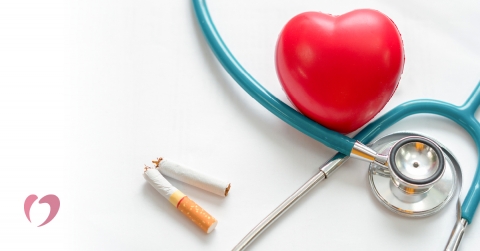How Smoking Impacts Heart Disease

Smoking is one of the worst things you can do to your body. It’s responsible for roughly 480,000 deaths per year in the United States. And the people around smokers aren’t immune either—exposure to secondhand smoke significantly increases the risk of heart disease and stroke.
Every part of your body suffers when you smoke, but your cardiopulmonary system takes a significant hit. Here’s what you need to know about smoking and heart disease.
Impact of smoking on the heart and circulatory system
When you light a cigarette and inhale, your heart speeds up and puts increased pressure on your entire system.
The chemicals in smoke thicken your blood, which makes it harder for your heart to pump. Think of it like the oil in your car. Once the oil starts to get old and thick, it’s harder for the car to pump it through and the engine runs rougher. Eventually the oil is too thick with impurities to pump through the engine and your engine will catastrophically break down. The same thing happens to your heart over time.
Smoking increases the amount of plaque in your blood vessels. Plaque and thickened blood can create clots that may break free and cause a stroke or other serious problems.
There are also less common problems like peripheral artery disease and abdominal aortic aneurysms that are directly tied to smoking.
Whether you’re a heavy or light smoker, it impacts your heart and circulatory system. The risk may be less for people who don’t smoke frequently, but it’s still significantly higher than the risk for a nonsmoker.
What happens when you quit smoking
Around 20 minutes after you finish smoking a cigarette, your heart goes back to its normal resting rate. It takes about 12 hours after you’ve had your last cigarette for the carbon monoxide levels in your blood to drop back to normal. Your stroke risk returns to normal after four years of not smoking.
While former smokers are still at higher risk for lung disease and other health problems than someone who has never smoked, your health will be better if you quit smoking than if you continue.
Getting help to quit smoking
If you want to quit smoking, there are a few different options to consider. Nicotine patches, gum, and other quitting aids that step down your dosage over time can help you wean yourself off nicotine dependence. Picking a quit date that has personal significance to you may help as well. Removing yourself from situations and people that make you want to smoke is also a big help in your journey to quit.
There are many support options for people who want to quit such as counseling groups, counseling programs, and online resources such as okhelpline.com and stopswithme.com. Without support it’s easy to slip back into old habits. You should also be aware of your triggers for smoking and do your best to stay away from them.
Quitting is hard, but it’s worth it. If you’re a smoker, talk to your Oklahoma Heart Hospital doctor today about quitting and the resources available to help you quit. We’re here to help you live a healthier life.




